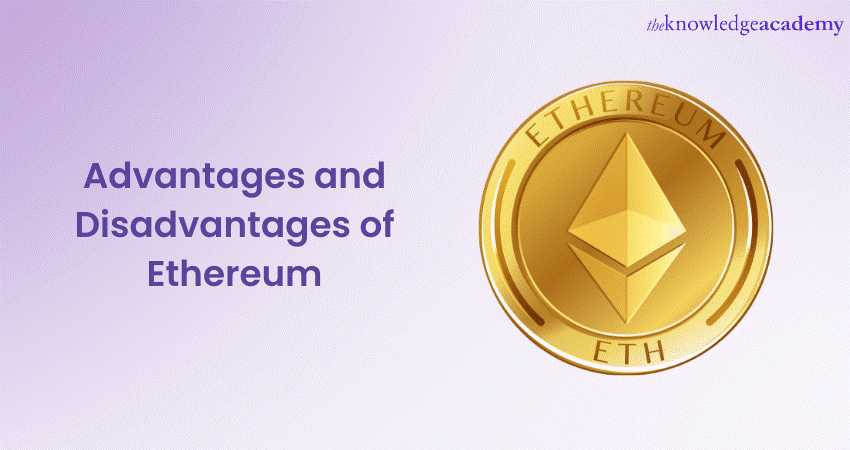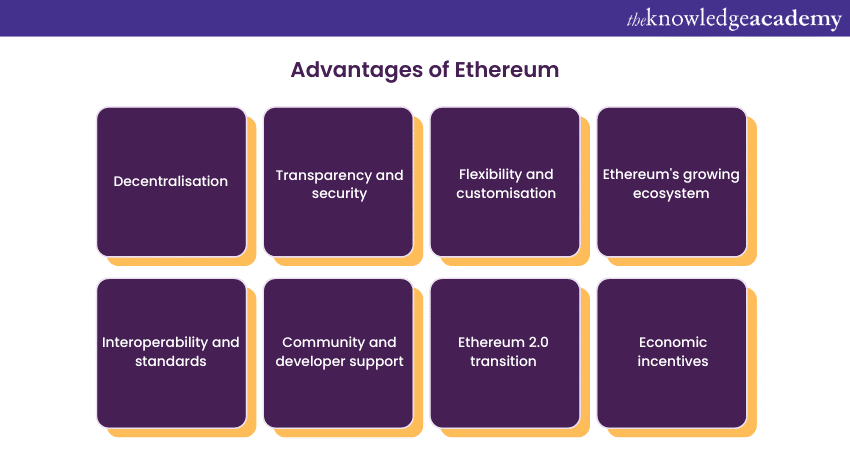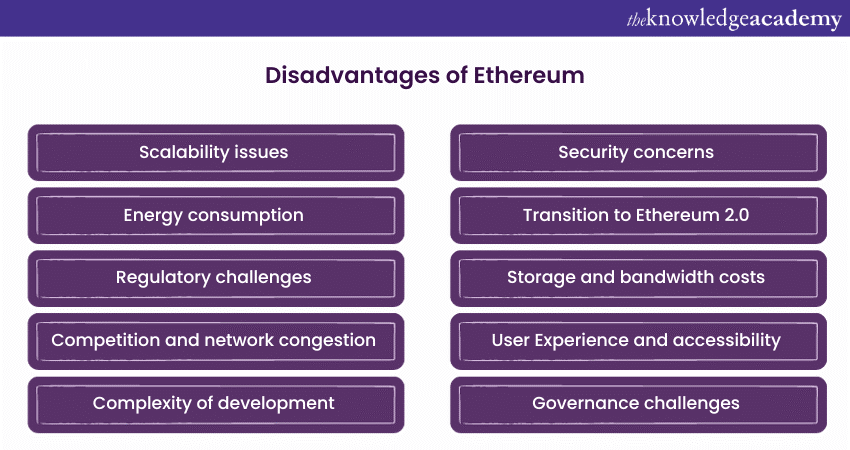We may not have the course you’re looking for. If you enquire or give us a call on 01344203999 and speak to our training experts, we may still be able to help with your training requirements.
Training Outcomes Within Your Budget!
We ensure quality, budget-alignment, and timely delivery by our expert instructors.

Ethereum is a pioneer in blockchain technology, revolutionising how we interact with decentralised applications and Smart Contracts. Ethereum's profound impact on industries cannot be overstated. Blockchain technology provides numerous benefits, such as facilitating Smart Contracts, promoting decentralisation, and enhancing transparency.
In our examination of the Advantages and Disadvantages of Ethereum, our goal is to present a fair view and highlight the factors shaping the future of blockchain.
Whether you're a curious enthusiast, a potential investor, or a seasoned trader, our blog offers a balanced perspective on Advantages and Disadvantages of Ethereum.
Table of Contents
1) Understanding what Ethereum is
2) Advantages of Ethereum
3) Disadvantages of Ethereum
4) Conclusion
Understanding what Ethereum is
Ethereum was proposed by a young programmer named Vitalik Buterin in late 2013, and its development officially began in early 2014. It was conceived as a response to certain limitations of Bitcoin, primarily its focus on being a digital currency and a limited scripting language for Smart Contracts. Buterin envisioned Ethereum as a decentralised platform for executing arbitrary code, which gave rise to the concept of Smart Contracts.
Intelligent Contracts are at the heart of Ethereum's innovation. These self-executing contracts with predefined rules and conditions enable trustless transactions and automate processes without relying on intermediaries. Think of them as digital agreements that automatically execute and enforce themselves when specific conditions are met. This concept has revolutionised industries by reducing the need for human oversight and increasing efficiency.
Ethereum's decentralisation principle extends beyond just Intelligent Contracts. The network operates on a global, decentralised blockchain secured by a network of nodes. These nodes validate transactions, ensuring that no central authority controls the platform. This decentralisation enhances security and empowers individuals, giving them control over their digital assets and data.
Ready to dive into the world of Blockchain technology and enhance your expertise? Explore our comprehensive Blockchain Training course and unlock exciting opportunities.
Advantages of Ethereum
Ethereum's most notable advantage is its pioneering role in introducing Intelligent Contracts to the blockchain world. Smart Contracts are self-executing, tamper-proof agreements with predefined rules that automatically execute when certain conditions are met. They enable trustless and automated transactions, eliminating the need for intermediaries like banks or lawyers.
This innovation has opened doors to various industries, including finance, supply chain, gaming, and healthcare.

Decentralisation
The Ethereum network operates in a decentralised method across nodes located globally. This means no single entity or central authority controls the platform, making it resistant to censorship, manipulation, or single points of failure. Decentralisation enhances security and fosters trust among users, ensuring that transactions and data are recorded transparently and immutably on the blockchain.
Transparency and security
All transactions and Smart Contracts executed on Ethereum are recorded on a public ledger, providing unparalleled openness. This transparency lowers the chance of fraud and corruption, as anyone can verify the authenticity of transactions. Moreover, Ethereum's security features, such as cryptographic encryption and decentralised consensus mechanisms, make it highly resistant to attacks.
Flexibility and customisation
Ethereum's flexibility allows developers to create various decentralised applications and tokens to suit different use cases. Ethereum's programming language, Solidity, supports Turing-complete Smart Contracts, enabling the creation of complex and customisable applications. This adaptability has led to the emergence of various innovative projects, including Decentralised Finance (DeFi) platforms, Non-Fungible Token (NFT) marketplaces, and more.
Ethereum's growing ecosystem
Ethereum has fostered a thriving and rapidly expanding ecosystem. Its open-source nature has encouraged collaboration and innovation, resulting in many projects, protocols, and initiatives built on the platform. Ethereum-based tokens and DApps have gained widespread adoption, attracting users and investors. The network effect generated by this growing ecosystem reinforces Ethereum's position as a leader in the blockchain space.
Interoperability and standards
Ethereum's adoption of common standards like ERC-20 (for fungible tokens) and ERC-721 (for non-fungible permits) has contributed significantly to the interoperability of blockchain assets. These standards have become widely accepted, facilitating the creation and exchange of tickets across different DApps and platforms. This has streamlined the development and integration of blockchain-based solutions.
Community and developer support
Ethereum boasts a large and active community of developers, enthusiasts, and stakeholders deeply committed to its growth and improvement. This strong community support results in continuous development, research, and upgrades to address issues and enhance the platform's capabilities.
Ethereum 2.0 transition
Ethereum is actively addressing its scalability and energy consumption issues with Ethereum 2.0. This multi-phase upgrade involves transitioning from a Proof-of-Work (PoW) to a more energy-efficient Proof-of-Stake (PoS) consensus mechanism. It also includes shard chains to improve scalability. Once fully implemented, Ethereum 2.0 is expected to enhance the platform's performance and sustainability significantly.
Economic incentives
Ethereum's native cryptocurrency, Ether (ETH), is a fuel for executing Smart Contracts and a store of value. This financial incentive system encourages participants to secure the network, validate transactions, and develop DApps, creating a self-sustaining ecosystem.
Are you ready to take your blockchain skills to the next level and become an Ethereum developer? Enroll in our Ethereum Developer Training course and get hands-on experience.
Disadvantages of Ethereum
Ethereum is undoubtedly a groundbreaking blockchain platform, but like any technology, it has its fair share of disadvantages and challenges. Understanding these drawbacks is essential for a comprehensive view of Ethereum's position in the blockchain ecosystem.

Scalability issues
Ethereum has faced significant scalability challenges, especially with high network congestion. As the number of users and transactions on the network increases, it can lead to slower confirmation times and higher transaction fees.
The blockchain's current capacity is limited, processing around 30 Transactions Per Second (TPS). This pales in comparison to traditional payment networks like Visa, which can handle thousands of TPS.
Energy consumption
Ethereum operates on a Proof-of-Work (PoW) consensus mechanism, like Bitcoin. PoW needs miners to solve complicated mathematical puzzles to validate transactions, which consumes vast computational power and energy.
This high energy consumption has raised environmental concerns, as it contributes to the carbon footprint associated with cryptocurrency mining.
Regulatory challenges
As Ethereum and the broader cryptocurrency space continue to gain traction, they face increasing regulatory scrutiny from governments and financial authorities worldwide.
Regulatory ambiguity can challenge Ethereum-based projects as they must navigate evolving compliance requirements and legal frameworks.
Competition and network congestion
Ethereum faces a rigid contest from other blockchain platforms that offer different features and scalability solutions. Venues like Binance Smart Chain, Solana, and Polkadot have gained popularity by addressing Ethereum's scalability issues.
Network congestion during periods of high demand can lead to delays and higher transaction fees, discouraging users and developers.
Complexity of development
Development on Ethereum can be complex and resource-intensive, particularly for newcomers. Innovative contract development requires expertise in Ethereum's architecture and programming language, Solidity.
Auditing Smart Contracts for vulnerabilities is critical but challenging, requiring additional time and resources.
Security concerns
While Ethereum is considered secure, Smart Contract vulnerabilities can lead to significant losses. Several high-profile hacks and exploits have occurred on Ethereum-based applications and Decentralised Finance (DeFi) platforms.
Smart Contract security is a critical concern that requires ongoing attention and auditing.
Transition to Ethereum 2.0
While Ethereum 2.0 promises solutions to scalability and energy consumption issues, its transition is a complex, multi-phase process that is still ongoing. Delays or unexpected challenges could impact the network's performance.
There needs to be more certainty regarding the success of Ethereum 2.0 and how it will affect the existing ecosystem.
Storage and bandwidth costs
Developing and deploying a full Ethereum node can be resource-intensive regarding storage and bandwidth requirements. As the Ethereum blockchain grows, these costs may become prohibitive for some users and node operators.
User Experience and accessibility
Interacting with Ethereum and its DApps can be challenging for non-technical users. Managing private keys, understanding gas fees, and navigating decentralised applications can be intimidating for newcomers. Improving the User Experience remains a priority for Ethereum developers.
Governance challenges
Ethereum's governance model is evolving, and decisions regarding upgrades and changes to the network can be contentious. Disagreements among stakeholders have the potential to impact the platform's development and direction.

Conclusion
As we conclude our journey on Ethereum, it becomes evident that it is a transformative force in blockchain technology. Its advantages, which include Smart Contracts, decentralisation, and a thriving ecosystem, have laid the foundation for innovation across industries. Despite its many advantages, Ethereum faces challenges in scalability and environmental impact, which require dedicated efforts to overcome. Ethereum is constantly improving, addressing its weaknesses while remaining a pioneer in blockchain technology. Understanding its advantages and disadvantages is essential as we navigate the exciting path ahead in the blockchain revolution.
Frequently Asked Questions
Upcoming Advanced Technology Resources Batches & Dates
Date
 Blockchain Training Course
Blockchain Training Course
Thu 11th Jul 2024
Thu 19th Dec 2024







 Top Rated Course
Top Rated Course


 If you wish to make any changes to your course, please
If you wish to make any changes to your course, please


